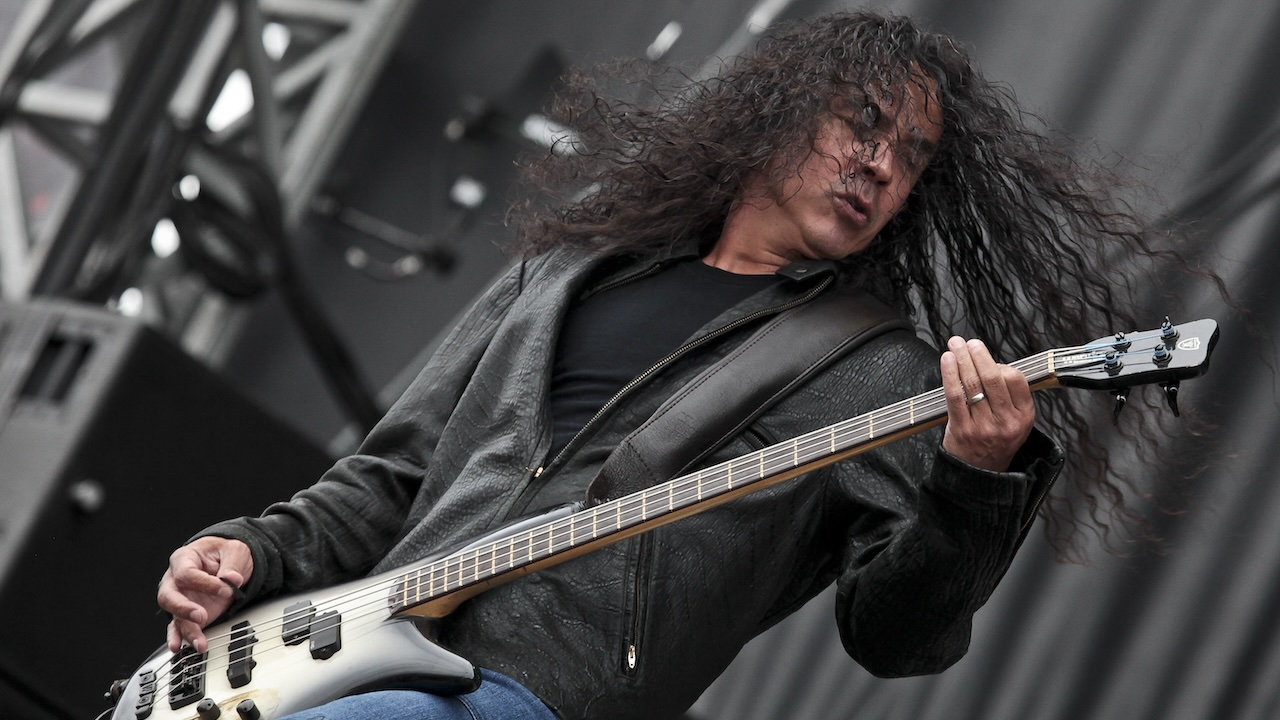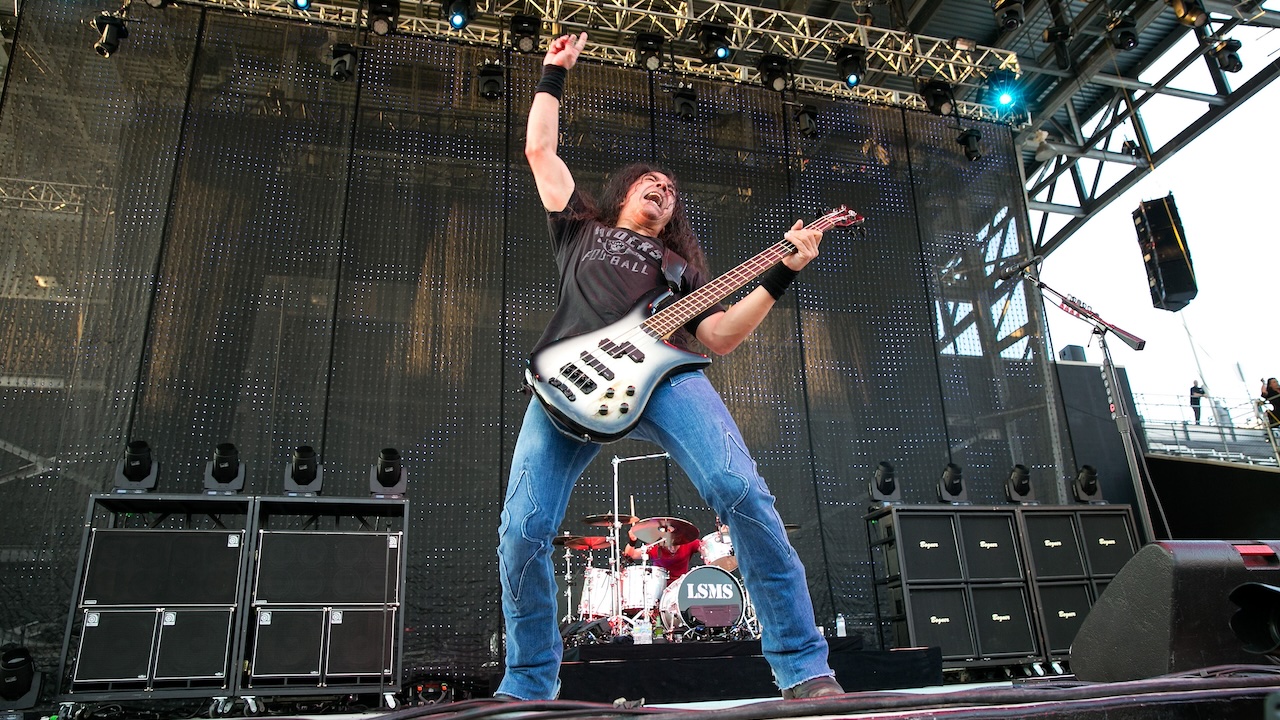“A personal crowning moment for me was having Lemmy ask me to play on a Motörhead record!” Alice in Chains’ Mike Inez on why Cliff Burton ruled, Paul McCartney's influence – and what John Entwistle told him (that he already knew)
Inez is a rock bass powerhouse, holding it down with AIC, Ozzy, Heart, guesting with Slash. Here he discusses a life in low-end and the evolution of his style

All the latest guitar news, interviews, lessons, reviews, deals and more, direct to your inbox!
You are now subscribed
Your newsletter sign-up was successful
You could be forgiven for bracketing Mike Inez as a rock bassist for hire. After all, he’s tackled the low-end with Ozzy Osbourne, and Alice in Chains, as well as featuring on albums by rock greats such as Black Label Society, and Motörhead.
“I really got to refine my style by virtue of playing with so many different artists,” Inez told Bass Player. “But a personal crowning moment for me was having Lemmy ask me to play on a Motörhead record!”
His vast range of musicality has also led to employment in the studio with rock titans Spys4Darwin, Guns N’ Roses legend Slash (Inez's grungy bass tone is all over It's Five O'Clock Somewhere by Slash's Snakepit), and Heart.
“I did five tours, an album, and a soundtrack with Ann and Nancy Wilson of Heart. That really stretched me out, musically. They’ll jam all day, perform at night, and then get on the bus and play Beatles tunes until 6AM. We would do country sessions jamming with Wynonna Judd, Carrie Underwood, Rufus Wainwright, and Gretchen Wilson. Music just oozes out of their pores.”
Talk of career highlights leads naturally to a discussion of Inez’s approach to the bass guitar. Having joined Alice in Chains following Mike Starr's departure after the recording of the Dirt album, his melodic, driving and grooving basslines quickly became an integral part of the band’s sound.
“Our music is so dense with guitars and vocals that sometimes I’ll just stay heavy and low to let everything ride on top. It all depends on the character of the song; I try to approach each one as it’s own entity.
“Often I’ll put a bass part down early on, and after I hear the guitars and vocals I’ll add to it or edit it down; or I’ll redo it altogether because I’ll hear a new line running through everything that will hook up all the notes. My dirty little secret is when I make a chart for a session, I chart it in treble clef, like a sax player.”
All the latest guitar news, interviews, lessons, reviews, deals and more, direct to your inbox!
Inez is best known for his insanely evolved pick technique since time immemorial (well, 1989), and interviews with him tend to reflect that fact, but has he dabbled with any other technical approaches over the years?
“It depends on the song. I use the pick to slam a lot of fifths and power chords, especially behind the guitar solos, and I do a lot of string bends with my left hand, and I like using vibrato and slides to make my parts fluid, but there’s also something about playing fingerstyle that makes you feel like a bonafide bassist.”
His list of personal bass heroes reveals much about his style as a musician. But who was it that originally inspired him? Asked to nominate the bassists who were most influential to him, Inez says:
“Paul McCartney is Bass Playing 101; a great place to start if you are just picking up the instrument. If you sit and listen to his basslines as their own little pieces you’ll be blown away by how much personality and humor he puts into them.”

Rock bassists also formed a major influence on a young Inez, with Cliff Burton being a favourite, thanks to his melodic playing and gritty tone, as was John Entwistle.
“I was instantly drawn to John Entwistle’s aggression and lead bass tones as an integral part of the Who. He never took the easy approach to his writing, and always wrote in context with each individual song.
“I remember meeting him at a Hollywood restaurant when I was starting out, and I said to him, ‘Mr Entwistle, I think you are a brilliant bass player.’ He looked me right in the eye and without blinking, said, ‘I fucking know that!’ and walked away. I thought that was the coolest thing ever!”
“Cliff Burton was magical to watch in concert with Metallica. I always felt he wasn’t there to entertain you, he was there to kick your face in! He had a unique way of focusing all that aggression and angst into a finely-tuned assault, delivered with the explosiveness of a shuttle launch. He smashed stereotypes of what the capabilities and limitations of the instrument were at the time.
“John Paul Jones is another fantastic all-around musician. His solid fundamentals gave him a great platform to experiment as a bassist, songwriter, and producer. Chops, tone, and an inventive brain – this dude is an all-timer!”
- Alice In Chains are on tour across the U.S. right now and play Black Sabbath's Back to the Beginning show on 5 July, Villa Park, Birmingham. See Alice in Chains for dates and ticket details.

Nick Wells was the Editor of Bass Guitar magazine from 2009 to 2011, before making strides into the world of Artist Relations with Sheldon Dingwall and Dingwall Guitars. He's also the producer of bass-centric documentaries, Walking the Changes and Beneath the Bassline, as well as Production Manager and Artist Liaison for ScottsBassLessons. In his free time, you'll find him jumping around his bedroom to Kool & The Gang while hammering the life out of his P-Bass.
You must confirm your public display name before commenting
Please logout and then login again, you will then be prompted to enter your display name.


